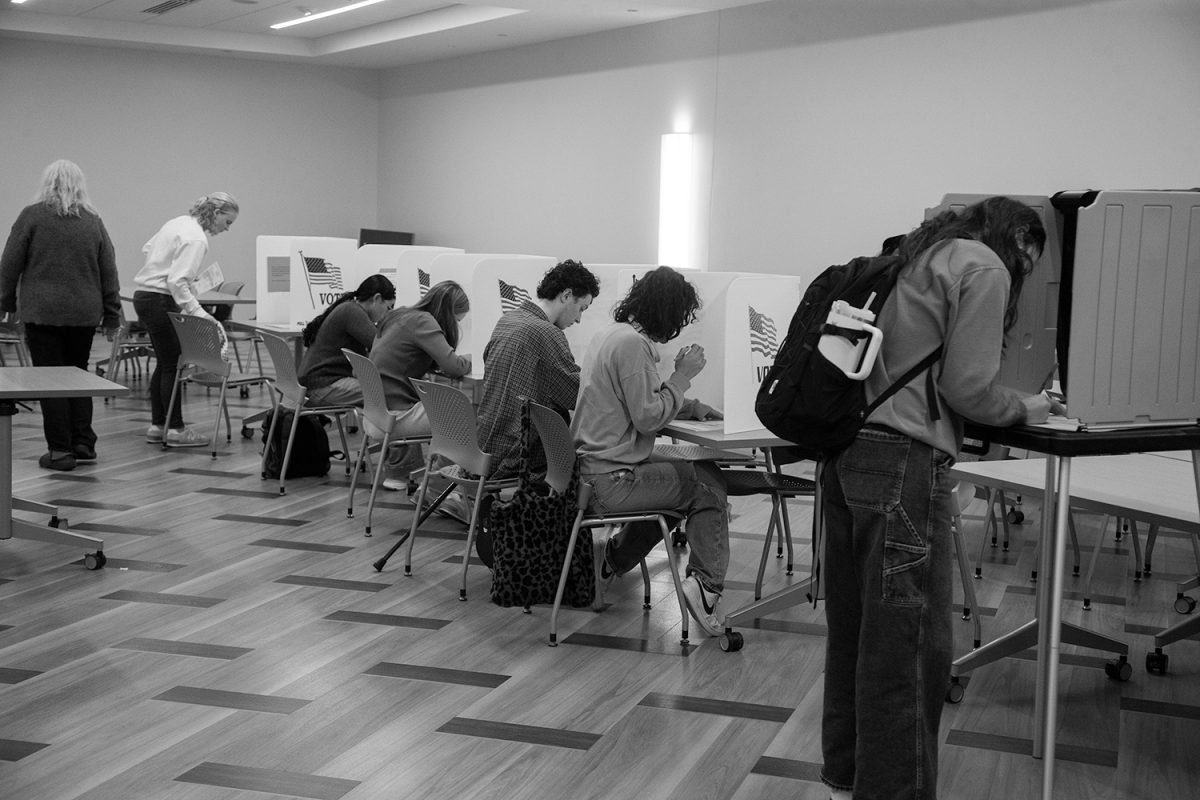As the results of Election Day continue to settle across the country, many members of the LGBTQ+ community are grappling with feelings of betrayal, fear, and uncertainty over President-elect Donald Trump’s agenda. In response, people flocked to mental health support services in droves — including Johnson County.
During the president-elect’s first administration, he supported policies restricting LGBTQ+ people from entering the military, receiving gender-affirming care, and worked to codify the definition of “sex,” which would have hindered people’s ability to identify as transgender, according to the American Civil Liberty Union.
On Nov. 6, following Trump’s sweeping win, mobile support services orchestrated by The Trevor Project, a national nonprofit support line geared toward LGBTQ+ individuals, increased by 700 percent compared to the organization’s volume in the prior weeks.
Additionally, the nonprofit reported election-related conversations had increased 5,200 percent compared to averages leading up to previous election days. Emma Huntzinger, communications manager for CommUnity Crisis Services in Johnson County, wrote in an email statement to The Daily Iowan they anticipated increased calls on election night.
“CommUnity’s Crisis Helping program, which answers the 988 Suicide and Crisis Lifeline chats and texts in the state of Iowa, increased staffing for the night of the election and the days following in anticipation of a surge in crisis contacts,” the statement read.
Jacob Priest, director for the LGBTQ Counseling Clinic at University of Iowa Health Care, said the clinic saw increases in people expressing fear and discomfort from the election results.
“Over the last couple of weeks, post the election, we have seen a lot of the patients that I work with in the LGBTQ Clinic really experience high levels of anxiety, stress, uncertainty, confusion stemming from real concerns,” Priest said.
In addition to his duties as the clinic’s director, Priest researches psychotherapy for graduate students, which contributed to the creation of the LGBTQ Counseling Clinic. The clinic provides a variety of services to members of the LGBTQ+ community, and Priest said many seek information on medical intervention and psychotherapy.
He said the clinic’s team has been working through these concerns with patients, but it is a real concern that health care for these individuals could be in jeopardy pending new policies.
“We have limited resources and limited space, and there’s more and more people who want that,” Priest said. “This is coming to the forefront because, in some ways, if policies are enacted that were promoted, they would lose access to life-saving healthcare.”
Iowa Gov. Kim Reynolds has introduced several laws to the Iowa legislature that restrict health care for LGBTQ+ individuals. In March 2023, Reynolds signed Senate File 538, restricting gender-affirming care to minors.
RELATED: Iowa Board of Regents position for more changes to DEI programming
In February, Reynolds proposed legislation that would codify the definition of “sex,” “man,” and “woman” into state law. If adopted, the bill would require the government to change how it issues birth certificates, drivers licenses, and its collection of public health data.
Natalie Fixmer-Oraiz, a member of the LGBTQ+ community and associate professor at the UI said the election results left her shocked and worried about more legislation targeted at the LGBTQ+ community.
“I would call it betrayal — that so many Americans would decide that queer people, among others, are disposable, that our rights don’t matter, that our access to health care doesn’t matter,” Natalie Fixmer-Oraiz said.
In the days leading up to the election, Natalie Fixmer-Oraiz co-authored an essay with her partner V Fixmer-Oraiz, who is a Johnson County supervisor, as well as MJ Meidlinger and Talia Meidlinger, which detail their experiences with harassment for openly appearing queer.
Natalie Fixmer-Oraiz said the article served as a call to action for Iowans to vote for Vice President Kamala Harris in the presidential election — a call that went largely unheard as Trump overwhelmingly won the state by over 13 percentage points.
Now, she says she is asking herself difficult questions about what lies ahead.
“What does safety look like? How are we going to care for each other? How are we going to do this work? How are we going to defend the people that we love? How are we going to defend ourselves? Those aren’t questions we should be asking in 2024, but those are the questions that we have to be asking,” she said.
Instead of calling for people to vote, Natalie Fixmer-Oraiz calls for people to help each other and not stay silent.
“I think for folks who identify as allies, my question in this moment is how you will step up and use your privilege,” she said. “Silence isn’t an option, right? It is an option, but it is a choice to allow homophobia and transphobia to be the values of our community.”



